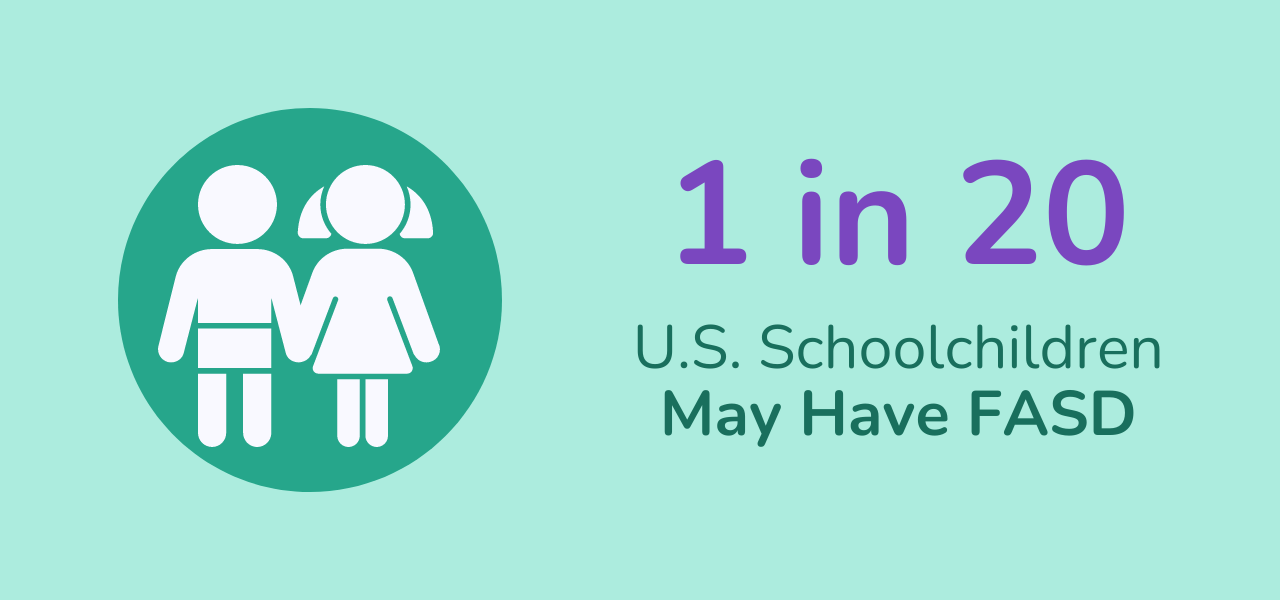A Known Cause of Lifelong Birth Defects
Disclaimer: This page houses important information and resources pertaining to alcohol during pregnancy and while breastfeeding, including links to our evidence-based Fact Sheets. However, the resources here should not replace the care and advice of a medical professional.
Alcohol is known to cause birth defects when it is consumed during pregnancy. It especially targets a baby’s brain, which is developing throughout all 40 weeks of pregnancy. There is no known safe level of alcohol use during pregnancy, and there is no type of alcohol that is safe to use. Alcohol crosses the placenta easily and reaches the developing baby. Exposure to alcohol during pregnancy can cause a range of life-long physical defects and intellectual, learning and behavioral difficulties that are known as Fetal Alcohol Spectrum Disorders (FASD). Affected individuals have mild-to-severe challenges meeting developmental milestones at home, in school, at work, and in society.

Referencia: CDC y TEAF: El consumo de alcohol durante el embarazo puede tener efectos de por vida.
Alcohol consumed by a person who is breastfeeding can also be found in their breastmilk. The amount of alcohol found in breastmilk is about the same level of alcohol that is found in a person’s bloodstream. Things like pumping and discarding milk, drinking water, taking caffeine, or exercising do not help your body get rid of the alcohol faster; only time can reduce the amount of alcohol in breastmilk.
“Of all the substances of abuse—including cocaine, methamphetamine, heroin and marijuana—alcohol produces by far the most serious neurobehavioral effects in a developing baby.”
— Institute of Medicine
Please see our library of resources below on alcohol exposure during pregnancy and breastfeeding.
Related Fact Sheets
Related Baby Blogs
- Spring Break Safety for Pregnant and Breastfeeding Women: Tips for a Fun and Safe Holiday
- We’ve Come a Long Way, Baby! What Have Four Decades Taught Us about Alcohol and Drugs in Pregnancy?
- A Main Course Of Knowledge With A Side Of Support, Please! 3 Tips That Help My Patients Prevent Birth Defects
- Alcohol: Be ‘In The Know’ If Nursing Baby
- Help for the Holidays: Surviving Stress During Pregnancy
- Forging Ahead With Facts As Her Fuel
- Alcohol, Tobacco & Marijuana: What You Need To Know During Breastfeeding
- The Allure of Alcohol: Why do Women Continue to Drink during Pregnancy?
- Guest Blog: Trouble in Paradise
- Asking Questions That Count When Considering Adoption
- Birth Defects Prevention Month Series- Alcohol, Smoking and Other Drugs: Why Ten Fingers Plus Ten Toes Doesn’t Always Equal the Whole Story
- Empowering Moms this Mother’s Day and Every Day: Making the Most of Prenatal Appointments
- Preventing Birth Defects: Is it Possible? Yes!
- Kombucha and Pregnancy: Answers to Your Brewing Questions
- Navigating the Holiday Menu during Pregnancy
- The Baby-Making Preconception Prep Guide
- Clearing The Smoke About Marijuana Use During Pregnancy
Related Podcasts
- Ep. 83: Living with FASD
- Ep. 82: Public Health Efforts on FASD
- Ep. 81: FASD Discovery and Prevalence
- Episode 24: Kombucha in Pregnancy and Breastfeeding
- Episode 15: 5 Tips for Birth Defects Prevention: Part 2
- Episode 11: Adoption and Exposures: What to Ask
- Episode 8: Opioids and Alcohol in Pregnancy: Part 2
- Episode 7: Opioids and Alcohol in Pregnancy: Questions during One Caller’s Adoption Process
External Resources
- Centers for Disease Control and Prevention
- FASD United: Expectant Parents
- March of Dimes
- National Institute on Alcohol Abuse and Alcoholism
- SAMHSA Behavioral Health Treatment Services Locator
Partners
Stay in Touch
Our e-Newsletter brings you the latest information, news, and resources from the experts at MotherToBaby.
Join a Study
Expecting parents deserve better information about medication use in pregnancy and breastfeeding – and you can help by participating in a study.
Ask Our Experts
Call, text, chat, or email for a free personalized risk assessment on exposures in pregnancy and breastfeeding.

